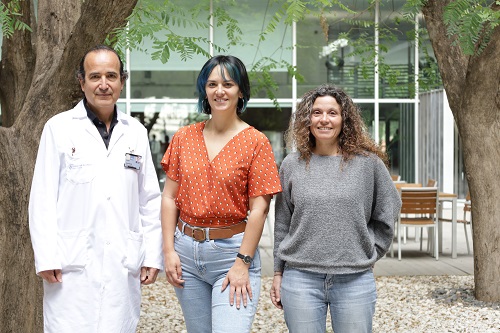
May 3rd, 2024 - Press notes
Natural Killer (NK) cells, when exposed to antibody treatment used against HER2-positive breast cancer, secrete specific types of cytokines that activate the immune response against tumor cells.
Researchers have confirmed that patients with NK lymphocytes present in the tumor environment show a better response to treatment, thanks to this mechanism.
This confirms the feasibility of using cytokines secreted by NK cells as markers of response to anti-HER2 antibodies with a simple blood test. It also reaffirms various clinical trials using these lymphocytes to bolster treatment in patients with metastatic HER2-positive breast cancer.
A specific type of lymphocyte, Natural Killer (NK) cells, known for their anti-tumor capacity, also have the ability, in combination with treatment against one of the most aggressive type of breast cancers, to alert the immune system to the presence of cancer cells. This ability allows them to recruit other immune cells to fight against the tumor. This was certified by a study published in the Journal of Experimental & Clinical Cancer Research, which also described a possible biomarker to identify patients who will have a positive response to treatment.

Joan Albanell, Sara Santana, Aura Muntasell
The study was led by researchers from the Immunity and Infection Research Group at the Hospital del Mar Research Institute, Dr. Aura Muntasell, who is also a professor at the Universitat Autònoma de Barcelona, and doctoral student Sara Santana. Oncology services at Hospital del Mar, led by Dr. Joan Albanell, Hospital Clínico de Valencia, led by Dr. Juan Miguel Cejalbo, and Hospital Universitario Virgen de la Victoria de Málaga, led by Dr. Emilio Alba, also participated. Pathological Anatomy services at Hospital del Mar, led by Dr. Laura Comerma, and Fundación Jiménez Díaz, led by Dr. Federico Rojo, collaborated, as well as the Cancer Research Network (CIBERONC).
Previous studies by the same group had certified that the presence of Natural Killer cells, a type of cytotoxic lymphocyte that can kill tumor cells, in the environment of HER2-positive breast cancer tumors was related to patients response to treatment with anti-HER2 antibodies. But despite this association, their numbers were lower than those of other immune cells, leading researchers to suspect that they also had a regulatory function in the body's defense response to cancer.
This new study focused on clarifying this aspect. By comparing the RNA set of biopsies from HER2-positive breast cancer tumors with and without NK cell presence, and using mouse models, the study demonstrated that these cells, when exposed to antibodies used against these tumors, secrete two types of small proteins, cytokines, and other soluble factors that modify the tumor microenvironment. This facilitates the arrival of other immune cells, reinforcing the action of cancer treatment.
"Part of the effect of anti-HER2 antibodies is not only due to their intrinsic effect on tumor cells, but these antibodies also allow, through NK cells, to initiate an anti-tumor immune response," explains Dr. Muntasell. These conclusions were confirmed by the analysis of 80 samples. It was observed that in those with higher levels of Natural Killer cells, there was also a greater presence of lymphocytes with anti-tumor capacity. In other words, they have the ability to alert the immune system and recruit other cells to attack and eliminate cancer cells.
Dr. Muntasell explains the mechanism involved in this process, suggesting that "the presence of NK cells in the presence of anti-HER2 antibodies triggers an anti-tumor immune response. Therefore, NK cells not only have a direct anti-tumor function because they can kill transformed cells, but they also trigger this alarm that allows other immune cells to reach the tumor and contribute to its elimination." In other words, they show the immune system where the tumor is so it can fight it.
The study also analyzed whether it would be possible to detect in the blood or serum of patients the factors that NK cells secrete when exposed to treatment with anti-HER2 antibodies. Through serum samples from patients undergoing treatment, their presence was confirmed in cases of people who had a positive response. "This new evidence reaffirms the ability of anti-HER2 therapy to induce an immune response that significantly correlates with greater therapeutic efficacy. This should serve us to continue advancing in the improvement and individualization of treatment for patients with HER2-positive breast cancer," notes Dr. Joan Albanell, head of the Oncology Service at Hospital del Mar, director of the Cancer Research Program at the center's research institute, and author of the study.
These findings validate therapeutic strategies currently under development, such as a clinical trial underway and led by the Vall d'Hebron Institute of Oncology (VHIO), with participation from Hospital del Mar, to infuse lymphocytes from a healthy donor into patients with metastatic HER2-positive breast cancer in combination with anti-HER2 antibodies. Also collaborating are the University Clinic of Navarra and the Puerta de Hierro Hospital in Madrid.
Researchers believe that these conclusions can be applicable to other types of tumors, as the study "evidences that NK lymphocyte activity as a cell capable of modifying the tumor environment is extrapolatable to other tumors," explains Dr. Muntasell.
Santana-Hernández, S., Suarez-Olmos, J., Servitja, S. et al. NK cell-triggered CCL5/IFNγ-CXCL9/10 axis underlies the clinical efficacy of neoadjuvant anti-HER2 antibodies in breast cancer. J Exp Clin Cancer Res 43, 10 (2024). https://doi.org/10.1186/s13046-023-02918-4
Parc Salut Mar
Passeig Marítim 25-29 Barcelona 08003
See location on Google maps
Phone: 93 248 30 00 · Fax: 93 248 32 54
Information request
© 2006 - 2024 Hospital del Mar · Legal notice and Privacy Police | Cookie Policy | Accessibility